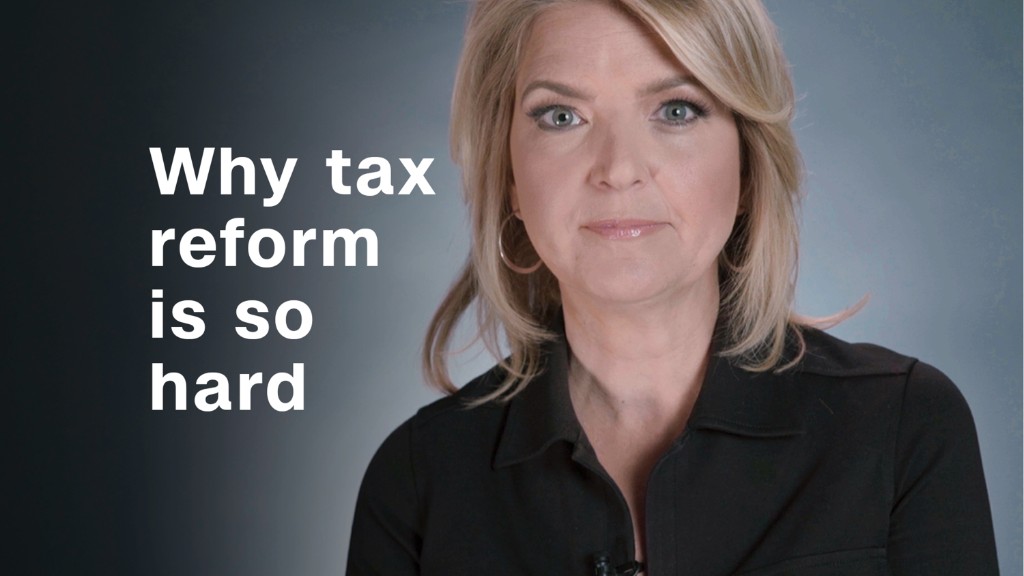
President Trump keeps pushing for a 15% corporate tax rate.
Cutting the rate that much -- from the current level of 35% -- would cost north of $2 trillion over a decade, according to estimates from the Tax Foundation and the Tax Policy Center.
And senior leaders in the House and Senate, including Senate Finance Committee Chairman Orrin Hatch and House Speaker Paul Ryan, have said that 15% just isn't doable.
"The numbers are hard to make that work. ... Our goal is to be at or below the industrialized world average -- that's 22.5%. Our goal is to get in the mid- to low-20s," Ryan said in a recent New York Times interview.
Ryan, along with other Republican leaders, had been pushing for tax reform to be revenue neutral, meaning it raises as much as the current code.
So it's notable that Ryan seemed noncommittal when asked by the Associated Press Wednesday whether he'd still insist on revenue-neutral tax reform.
"What you're going to see is us pushing forward on a tax reform plan that is pro-growth, pro-jobs and puts America in a much more competitive decision. And those other details are details that will be worked out by our tax writing committees."
So just how low will the GOP go on the corporate rate?
Related: Will retroactive tax cuts help the economy?
The cost of each percentage point drop in the corporate rate is about $100 billion over a decade, according to various estimates.
So lowering the rate to somewhere between 20% and 25% would cost between $1 trillion and $1.5 trillion.
Even getting into that zone might prove too ambitious, if Republicans start to get cold feet over adding to the debt. If so, they would need to find ways to offset the revenue loss from tax cuts with other revenue-raising measures.
"They don't have enough revenue raisers that they agree on to get to 25%, let alone 20%," said Martin Sullivan, Tax Analysts' chief economist.
Indeed, Sullivan added, they can't get past 30% without the use of budget gimmicks, which hide the true cost of a tax cut.
Related from CNN: Paul Ryan won't commit to a revenue-neutral tax plan
For context, consider that getting the corporate rate down to 26% without adding to deficits would require the elimination of all corporate tax breaks, according to the Tax Policy Center. And Republicans have already said they want to preserve, and in some cases expand, some of those breaks.
There's another factor that could put the kibosh on a very low corporate rate: Senate rules.
Republicans are not counting on much, if any Democratic support. So as a backstop they want to be able to pass tax reform with a simple majority under a rule known as reconciliation. To do that, they have to make sure the bill doesn't add to deficits beyond the first 10 years. If it does, then the provisions in the bill must expire at the end of that first decade unless other provisions are added to offset the revenue loss in the later years.
Related: Trump keeps saying the U.S. is the highest taxed country in the world. It's not.
Republicans got bad news on that front last spring. The Joint Committee on Taxation did an analysis of what the deficit effects would be if Congress cut the corporate rate to 20% for just three years. Turns out that temporary rate cut would result in a loss of revenue after the 10-year period, according to the analysis.
In other words, even a short-term drop to 20% would violate the reconciliation rule.
That means Republicans would either have to agree to a higher corporate rate that doesn't add to deficits in the long term. Or they would have to come up with other revenue-raising measures to offfset the loss from a temporary 20% rate, which would be much larger if Congress wanted to make it permanent or just have it in effect for more than three years.
That will be hard to do, and not just because a corporate rate cut is only one of many costly tax cuts Republicans want to pass. It also will be hard because there are never easy ways to pay for tax cuts. Most of them would involve losing longstanding tax breaks lobbied for by special interests or which have become very popular among voters.
As one tax lobbyist put it, when it comes to cutting taxes, "Everyone wants to go to heaven, but nobody wants to die."
-- CNN's Deirdre Walsh and Ashley Killough contributed to this report


